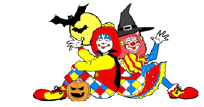Hospital clowns, like other clowns, perform [mostly] to make people laugh, be happy or forget their troubles, if only for a moment. As we all know, there is a human being behind the red nose, and this person must take care of him/herself in order to give their best to their “audience”. This means they must lead a healthy lifestyle, including eating well, sleeping well, hydrating and getting exercise. The hospital clown must add more activities to this list, however; getting flu shots, using personal protective equipment and performing proper hand hygiene are among them.
These performers must also be allowed to drop the clown persona when they are not performing. When it was time for a meal break in the hospital where I worked, for example, we would remove our jackets and hats to eat in the cafeteria at a table far away from visitors and employees. We would not ignore them, but we would behave like ourselves and not our clown character so that they understood that we were on a break.
Although hospital clowns are on hand to entertain or distract, they interact on a regular basis with children who are suffering and dying. Not only is special training and sensitivity required in order to deal with such interactions, hospital clowns also need a therapeutic forum in order to express their feelings about this. During a shift, they must keep these feelings and reactions to themselves, while simultaneously expressing the necessary empathy in the moment, and then be able to move on to a happier room and avoid dropping their energy. (It can be argued that medical caregivers also need a therapeutic forum.)
My former hospital clown employer provided us with group therapy sessions during each monthly rehearsal in order to vent about the sad things we saw during our shifts. We even had a special discussion after the death of Robin Williams, who not only was a comedic genius but also played the father of hospital clowning, Patch Adams, in a film.
Before flights, airline personnel explain that a passenger must first put on their oxygen masks before helping others with theirs, with good reason. In the same way, hospital clowns help patients, visitors and employees along in their various journeys, but they must take care of themselves in order to do so.
 Lucy E. Nunez has been a theatrical performer since 2002 and an improv performer since 2003. She created Nurse Lulu for the Big Apple Circus Clown Care program in 2014. She is now Baptist Children's Hospital first-ever resident clown! For more information please visit: www.sunnybearbuds.wix.com/buds
Lucy E. Nunez has been a theatrical performer since 2002 and an improv performer since 2003. She created Nurse Lulu for the Big Apple Circus Clown Care program in 2014. She is now Baptist Children's Hospital first-ever resident clown! For more information please visit: www.sunnybearbuds.wix.com/buds
